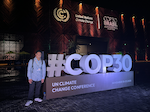
Natalie Pitman ’17 knew she wasn’t supposed to get too close to the whale shark.
She had been studying them for the past semester as a part of her field research during her semester abroad in Australia. As a result, she was well versed in the legislation enacted for their protection. No hunting whale sharks. No tour boats getting too close. No diving underneath them, unless for scientific research. The only reason why she was even allowed to swim with them was because of her research—and the connections of her research advisor, Australia’s leading whale shark expert.
None of that made a difference, though, as the whale shark insisted on swimming in her direction.
“Every whale shark has a different personality,” Pitman said. “Some are very fast, some are slow, some don’t care that we are there at all, but this one was very interested in us. He had small eyes and couldn’t see very well, so he kept swimming at us and we had to keep moving out of the way.
“It was my last trip into the water, and it was just such a fantastic experience.”

Following a dream
When Pitman first began looking at colleges, she knew she would have the opportunity to study abroad, conduct hands-on research, and more to explore her academic interests when she first began researching Gettysburg.
“I’m from Massachusetts, but I heard about the College from my high school environmental science teacher. He is an alum and encouraged me to check it out,” Pitman said. “I went on a tour my junior year and knew that I wanted to go here when I would compare every subsequent school I visited to Gettysburg.”
She had recognized her love for marine biology long before coming to Gettysburg, and was looking forward to studying science and working closely with her professors on research.
Despite her love of science, though, she knew she wanted to study different academic disciplines. As a result, her first course here—a First-Year Seminar called Plato, Personhood, and Popcorn with philosophy Prof. Vernon Cisney—focused on the philosophy of what it means to be a person through various movies.
“As much as I knew that I wanted to study science here, I also knew that I wanted to take courses outside of the sciences, too,” Pitman said. “My First-Year Seminar was great because we would all get together outside of class to watch movies for class, and it really allowed me to make more connections across campus.”
She also got involved in Biosphere, a student-run organization that advances discussions of the sciences with an emphasis on biology. By her sophomore year, she declared a biology major with a chemistry minor, became a member of Tri Sigma, and began thinking about studying abroad.
“I was looking for opportunities to study marine biology a little more hands-on and was looking at programs in a few different countries,” Pitman said. “That’s when the Center for Global Education told me that I could study abroad in Australia and participate in a month-long research component right on the Great Barrier Reef. It had always been a dream of mine, so of course that is where I applied.”

Learning in the field
After arriving in Australia, Pitman began to settle into a rhythm with her classes: attend a lecture, go snorkeling, attend another lecture, go snorkeling some more. Her program also traveled to different parts of Australia to give them greater exposure to the diversity of research available in their program. There was a rainforest component, a week-long camping trip, a reef component on Lizard Island, and then research on the Great Barrier Reef.
At this point, students were charged with developing their own research project—the only stipulations were that the research take place in Australia and involve an advisor.
“The program gave us a huge range to work with,” Pitman said. “At first, I was thinking of researching black tip sharks, but after hearing my advisor tell me about his research with whale sharks, I couldn’t control my excitement. I began doing research and emailing everyone who had ever worked with whale sharks.”
Once her subject was clarified, her research topic fell into place. She examined the return rate of whale sharks to Ningaloo Reef in western Australia. In addition to analyzing data of whale shark sightings in the Ningaloo Reef over the past two years, she collected new data by going on boat tours and swimming in the reef, prepared the data for future analysis, and assisted in identifying whale shark photos by using a specific algorithm to map their spots—using the same algorithm used by astronauts to identify new constellations.
“The research we were conducting examined whether or not the legislation that had been enacted in that area helped the whale shark population increase as compared to other places,” Pitman said. “It was so incredible. The whole semester abroad has given me such a greater appreciation for learning by experiencing something first-hand.”

Making career and graduate school connections
Now a senior, Pitman is finding ways to expand on the lessons she learned while abroad. She found a summer internship with the National Marine Life Center in Buzzards Bay, Massachusetts, and is completing an independent research project with her Prof. Alex Trillo. She is also solidifying her post-graduation plans—a year conducting working and researching in the field, followed by a graduate school program focusing on marine biology.
Above all else, though, Pitman is encouraging her peers to pursue their passion.
“My semester abroad was so influential and life changing,” Pitman explained. “It all started because I knew I wanted to study marine biology so many years ago. That led me to studying biology here, which led me to studying abroad, which led me to an internship at Buzzards Bay. Once you know what you’re interested in, you’ll find so many doors open to enable you to pursue that interest.”


